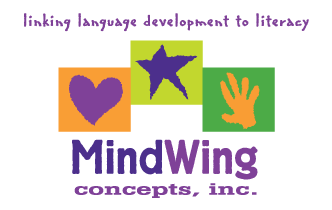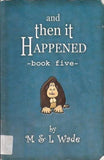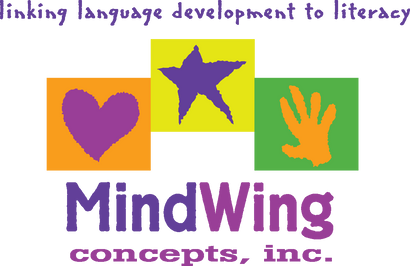Secure Checkout. FREE SHIPPING for Continental U.S. Orders over $60.
Menu
-
- Home
-
About Us
-
The Approach
-
Linking Language & Literacy
-
MindWing Learning
-
Learning Resources
-
SHOP
-
Blog
-
- About MindWing
- Our People
- Contact Us
- Your Account
- Login
-
United States (USD $)

Secure Checkout. FREE SHIPPING for Continental U.S. Orders over $60.

A Hopeful Message for the New Year: “The Rabbit Listened” by Cori Doerrfeld
January 06, 2021
 In celebration of the New Year, we want to focus on a message of “hope,” so we have chosen a selection of children's literature called The Rabbit Listened, by Cori Doerrfeld, for use with the Story Grammar Marker® or Braidy the StoryBraid® in school, for remote learning, or at home! In this Blog post, we will share an analysis of story elements and narrative structure using Story Grammar Marker® icons, a discussion of the message and metaphoric meaning, as well as activities with FREE downloads (found toward end of post)...
In celebration of the New Year, we want to focus on a message of “hope,” so we have chosen a selection of children's literature called The Rabbit Listened, by Cori Doerrfeld, for use with the Story Grammar Marker® or Braidy the StoryBraid® in school, for remote learning, or at home! In this Blog post, we will share an analysis of story elements and narrative structure using Story Grammar Marker® icons, a discussion of the message and metaphoric meaning, as well as activities with FREE downloads (found toward end of post)...

Tech Tuesday: Summer Study Series on an RCT of Narrative Intervention for Adolescents
July 23, 2020 1 Comment
 We look at an exciting piece of research from last summer (July/August 2019), Improving storytelling and vocabulary in secondary school students with language disorder: a randomized controlled trial* (full article available at link). In this article, Joffe, Rixton and Hulme describe a randomized controlled trial (RCT) involving both narrative and vocabulary intervention for secondary students in the UK. It is notable because RCTs in language intervention are relatively rare, and considered a high level of evidence. ASHA, on a scale of evidence quality, rates “well designed randomized controlled trials” as level 1b, 2nd on a 6-point scale of evidence; these are research studies in which intervention groups are compared to a control group in which no intervention was provided. Additionally, interventions for adolescents with persistent language problems are less researched, so this study is an important one!...
We look at an exciting piece of research from last summer (July/August 2019), Improving storytelling and vocabulary in secondary school students with language disorder: a randomized controlled trial* (full article available at link). In this article, Joffe, Rixton and Hulme describe a randomized controlled trial (RCT) involving both narrative and vocabulary intervention for secondary students in the UK. It is notable because RCTs in language intervention are relatively rare, and considered a high level of evidence. ASHA, on a scale of evidence quality, rates “well designed randomized controlled trials” as level 1b, 2nd on a 6-point scale of evidence; these are research studies in which intervention groups are compared to a control group in which no intervention was provided. Additionally, interventions for adolescents with persistent language problems are less researched, so this study is an important one!...

May 6, 2020: Thoughtful poetry for all times…
May 06, 2020 1 Comment
 Woodson, J. (2014). Brown Girl Dreaming. NY: Putnam. This is a book of poetry centering on the author’s life experiences growing up in Ohio. She remembers life as a child and applies these memories to her future. There are two poems that I would like to cite: “every wish, one dream,” (pages 313–314) and “it’ll be scary sometimes,” (pages 13–14). The first selection is about Woodson’s dream of becoming a writer. As many writers have, she has read much and remembered the themes, lines of stories and poems, and their life lessons. As I read the passage to you, think about her expression of her life’s goal. The second poem is about a memory from early life stories about family experiences from past generations. Handout Available...
Woodson, J. (2014). Brown Girl Dreaming. NY: Putnam. This is a book of poetry centering on the author’s life experiences growing up in Ohio. She remembers life as a child and applies these memories to her future. There are two poems that I would like to cite: “every wish, one dream,” (pages 313–314) and “it’ll be scary sometimes,” (pages 13–14). The first selection is about Woodson’s dream of becoming a writer. As many writers have, she has read much and remembered the themes, lines of stories and poems, and their life lessons. As I read the passage to you, think about her expression of her life’s goal. The second poem is about a memory from early life stories about family experiences from past generations. Handout Available...

May 5, 2020: A book of short stories with serious messages through many voices
May 05, 2020

Fleischman, R. (2004). Seedfolks. NY: Harper Trophy. This is a collection of voices of people who, in one way or another, relate to a vacant lot in Cleveland, Ohio, during the 1930s. The vacant lot is full of smelly trash dumped there over a period of years. Gradually, people are drawn to the site to plant, see things grow and to socialize. All are people who have sustained great hardships in life. Each short chapter is a snippet of their experience, mostly as immigrants to our country. I’ve selected the character Leona as a focus for this lesson. Leona’s chapter begins with a memory of her grandmother. The memory centered on goldenrod tea with a nutmeg floating in it. Her grandmother drank it every day to ward off illness…and any doctor! There are several kick-offs that signal mini-episodes within this short story. Handout Available...

May 1, 2020: “And Then It Happened”—Books for Older Students
May 01, 2020
 Wade, M & L. (2006). And Then It Happened. Ontario, Canada: Books for Boys. This series of books was given to me when I was in Ontario, Canada, presenting about narrative development. I thought I would present one of these stories today since there is an opportunity to have a little fun with the content of these volumes. The short stories are written for boys (and girls) between grades 3 & 6. The website www.boysbookshelf.com provides a sample short story from each of the volumes as well as listings of all the Canadian school systems visited by Michael Wade, one of the authors. My favorite story is “The Giant Cupcakes.” I have used it as reader’s theater with props. It is lots of fun. There are several Kick-Offs throughout this short story. Handout Available...
Wade, M & L. (2006). And Then It Happened. Ontario, Canada: Books for Boys. This series of books was given to me when I was in Ontario, Canada, presenting about narrative development. I thought I would present one of these stories today since there is an opportunity to have a little fun with the content of these volumes. The short stories are written for boys (and girls) between grades 3 & 6. The website www.boysbookshelf.com provides a sample short story from each of the volumes as well as listings of all the Canadian school systems visited by Michael Wade, one of the authors. My favorite story is “The Giant Cupcakes.” I have used it as reader’s theater with props. It is lots of fun. There are several Kick-Offs throughout this short story. Handout Available...

April 29, 2020: Esperanza Rising’s Theme of Hope: A Book for Use with Older Students
April 29, 2020
Today, I am continuing discussing the books that I recommended yesterday for students who are older and would like to read short stories, verse and novels. I cited eight titles and provided annotations for each. Each of the books focuses on the theme of resilience and with the ability to take perspective of self and others, students will be able to “see themselves through others’ experiences” and reflect on their lives in general. During the next several days, I will provide a glimpse into each book and refer to the Story Grammar Marker®. Today we will apply the Story Grammar Marker® to Esperanza Rising, chapter 1. I chose Esperanza Rising as the first in this series since Esperanza means “HOPE.” Hope is a vital character trait for us to focus on during these times. Through literature, students learn about themselves, through others’ experiences. They see resilience in action!

